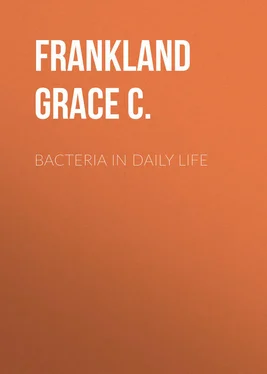Grace Frankland - Bacteria in Daily Life
Здесь есть возможность читать онлайн «Grace Frankland - Bacteria in Daily Life» — ознакомительный отрывок электронной книги совершенно бесплатно, а после прочтения отрывка купить полную версию. В некоторых случаях можно слушать аудио, скачать через торрент в формате fb2 и присутствует краткое содержание. Жанр: Медицина, foreign_antique, foreign_prose, на английском языке. Описание произведения, (предисловие) а так же отзывы посетителей доступны на портале библиотеки ЛибКат.
- Название:Bacteria in Daily Life
- Автор:
- Жанр:
- Год:неизвестен
- ISBN:нет данных
- Рейтинг книги:4 / 5. Голосов: 1
-
Избранное:Добавить в избранное
- Отзывы:
-
Ваша оценка:
- 80
- 1
- 2
- 3
- 4
- 5
Bacteria in Daily Life: краткое содержание, описание и аннотация
Предлагаем к чтению аннотацию, описание, краткое содержание или предисловие (зависит от того, что написал сам автор книги «Bacteria in Daily Life»). Если вы не нашли необходимую информацию о книге — напишите в комментариях, мы постараемся отыскать её.
Bacteria in Daily Life — читать онлайн ознакомительный отрывок
Ниже представлен текст книги, разбитый по страницам. Система сохранения места последней прочитанной страницы, позволяет с удобством читать онлайн бесплатно книгу «Bacteria in Daily Life», без необходимости каждый раз заново искать на чём Вы остановились. Поставьте закладку, и сможете в любой момент перейти на страницу, на которой закончили чтение.
Интервал:
Закладка:
The above short sketch may serve to convey some idea of the rise and phenomenal development of bacteriology during the past sixty years. To record, even in outline, the individual triumphs of the various branches of this science would require volumes, whilst the astounding mass of work already accumulated by its devotees is but the earnest, the guarantee of yet greater achievements in the future.
The progress which has been made in this brief period of time must not necessarily be expected to continue at this rapid rate; it may be that generations to come have yet the hardest and the longest tasks to accomplish; for in science, as in other walks of life, it is, as a rule, the easiest problems, which are first disposed of, and the farther we advance the more complicated, the more intricate become the questions to be attacked, the difficulties to be overcome.
The late Queen's reign has bestowed a splendid legacy of bacteriological discoveries upon those who, in the future as in the present, must inevitably follow in the footsteps of those great and brilliant leaders of bacteriological science belonging to this auspicious era, Louis Pasteur and Robert Koch.
WHAT WE BREATHE
Few people realise that, with the advent of autumn, the great majority of the swarms of bacteria which have been circulating in the air during the hot summer months take their leave of us and disappear.
Practically, however, we are all conscious of this fact, for we know what greater difficulties attend the keeping of food sweet and wholesome in the summer than are met with in the winter; bacteria, not unlike some other armies of occupation, securing a footing rather by their numbers at this season of the year, than by virtue of the superior strategy or, in other words, special attributes of their units. Bacterial operations are, however, distinctly favoured by the accident of temperature, the warmth of the summer encouraging their vitality and multiplication.
When Pasteur first announced his conviction that the familiar phenomena of putrefaction and decay were due to minute living particles present in our surroundings, his sceptical critics sought to ridicule his conclusions by declaring that, were this the case, the air must of necessity be so heavily laden with living forms that we should be surrounded by a thick fog – "dense comme du fer." We do not now, forty years later, require to recite the exquisitely simple experiments which, whilst sufficiently establishing his theories, served to effectually suppress those of his opponents.
Since Pasteur's pioneering work was carried out, a vast number of investigations have been made in all parts of the world by scientists of almost every nationality on the subject of the distribution of bacteria in air, and not only on their distribution, but on their functions or the place they occupy in the economy of nature. With our increased knowledge concerning their distribution has come our ability to differentiate between individuals, and to adequately assess the value and importance of their work from various points of view.
In the bacterial treatment of sewage we have not only one of the latest, but perhaps also one of the most successful examples of that system of division of labour, or specialisation of energy, which forms such a characteristic feature of work of all kinds at the present time. Other familiar instances of the applications of individual and special bacterial labourers to the solution of industrial problems are to be found in the conduct of commercial undertakings of such national magnitude and importance as brewing and agriculture. But it is not with these beneficent or great industrial classes of bacteria that we are now more immediately concerned, but rather with the malevolent varieties, or the so-called "submerged tenth," for which no labour colony has at present been created to direct their energies into useful and profitable channels.
We know that as regards mere numbers the bacteria in air may vary from 0 to millions in a couple of gallons, these extremes being dependent upon the surrounding conditions or relative purity of the atmosphere.
Out at sea, beyond the reach of land breezes, it is no uncommon thing to find none whatever; on mountains and even hills of humble elevation the paucity of bacteria is very marked if there are no abnormal or untoward circumstances contributing to their distribution. In illustration of this the recent investigations of the air on the summit of Mont Blanc by M. Jean Binot are of especial interest, inasmuch as the altitude at which they were carried out is the highest at which the search after bacteria has so far been pursued. This intrepid investigator spent no less than five days in the observatory, which is situated on the top of the mountain. As was to be anticipated, frequently no bacteria at all were found, and it was only when such comparatively large volumes of air as one thousand litres (about 200 gallons) were explored that microbes in numbers varying from four to eleven were discovered. The air of the country is far freer from microbial life than that of cities; whilst open spaces, such as those afforded by the London parks, are paradises of purity compared with the streets with their attendant bacterial slums.
That it is no exaggeration to describe streets from the bacterial point of view as slums is to be gathered from the fact that much less than a thimbleful of that dust which is associated with the blustering days of March and the scorching pavements of summer may contain from nine hundred to one hundred and sixty millions of bacteria. But investigators have not been content to merely quantitatively examine street dust; in addition to estimating the numerical strength of these bacterial dust-battalions, the individual characteristics of their units have been exhaustively studied, and the capacity for work, beneficent or otherwise, possessed by them has been carefully recorded. The qualitative discrimination of the bacteria present in dust has resulted in the discovery of, amongst other disease germs, the consumption bacillus, the lock-jaw or tetanus bacillus, bacteria associated with diphtheria, typhoid fever, pulmonary affections, and various septic processes. Such is the appetising menu which dust furnishes for our delectation.
There can be no doubt, therefore, that dust forms a very important distributing agent for micro-organisms, dust particles, aided by the wind, being to bacteria what the modern motor-car, with its benzine or electric current, is to the ambitious itinerant of the present day. Attached to dust, bacteria get transmitted with the greatest facility from place to place, and hence the significance of their presence in dust.
Mention has been made of the fact that the germs of typhoid fever have been discovered in dust, and the belief in the possibility of this disease being spread by dust is gaining ground.
An interesting case in point is afforded by an outbreak of typhoid fever which occurred in Athens a few years ago, and in which the starting-point or nucleus was discovered to be a group of labourers who were engaged upon excavating the soil in a street through which a sewer had once been taken. The epidemic subsequently spread to those districts of the city swept by the prevailing wind, which passed over the place where the soil had been turned up and exposed. M. Bambas, who brought his observations before the International Congress of Hygiene at Buda-Pesth, was convinced from the inquiries he made that this outbreak of typhoid was due to the disturbance of the soil and the dissemination by means of the wind of typhoid-dust-particles to certain parts of the city.
That this hypothesis is by no means without experimental justification is shown by the properties possessed by the typhoid bacillus in regard to its vitality in soil which have been discovered. Thus numerous investigators have studied the important question of the behaviour of this micro-organism in soil, and have found that it can exist over periods extending from three to twelve or more months in the ground. This property of the typhoid bacillus may possibly explain the appearance over and over again of typhoid fever in particular localities, suggesting that the bacteria had become indigenous in the soil.
Читать дальшеИнтервал:
Закладка:
Похожие книги на «Bacteria in Daily Life»
Представляем Вашему вниманию похожие книги на «Bacteria in Daily Life» списком для выбора. Мы отобрали схожую по названию и смыслу литературу в надежде предоставить читателям больше вариантов отыскать новые, интересные, ещё непрочитанные произведения.
Обсуждение, отзывы о книге «Bacteria in Daily Life» и просто собственные мнения читателей. Оставьте ваши комментарии, напишите, что Вы думаете о произведении, его смысле или главных героях. Укажите что конкретно понравилось, а что нет, и почему Вы так считаете.












